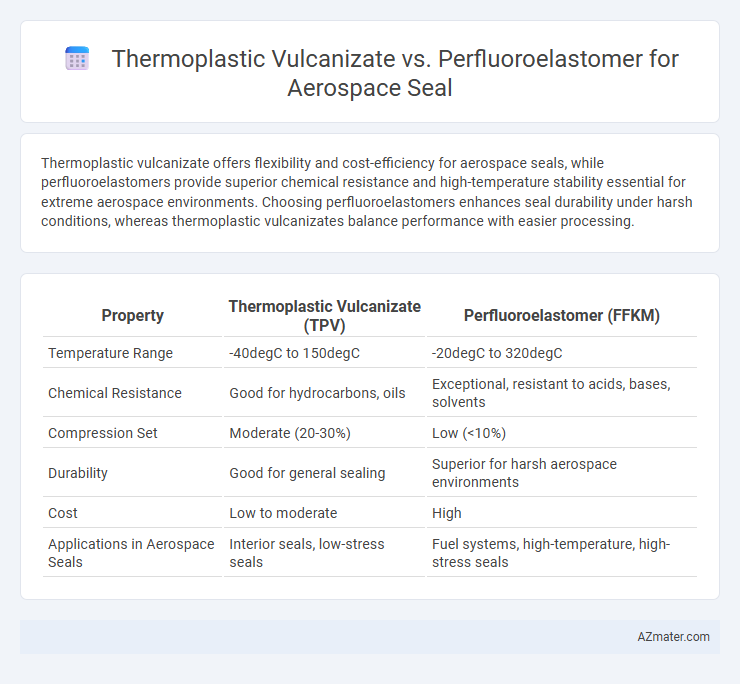Thermoplastic vulcanizate offers flexibility and cost-efficiency for aerospace seals, while perfluoroelastomers provide superior chemical resistance and high-temperature stability essential for extreme aerospace environments. Choosing perfluoroelastomers enhances seal durability under harsh conditions, whereas thermoplastic vulcanizates balance performance with easier processing.
Table of Comparison
| Property | Thermoplastic Vulcanizate (TPV) | Perfluoroelastomer (FFKM) |
|---|---|---|
| Temperature Range | -40degC to 150degC | -20degC to 320degC |
| Chemical Resistance | Good for hydrocarbons, oils | Exceptional, resistant to acids, bases, solvents |
| Compression Set | Moderate (20-30%) | Low (<10%) |
| Durability | Good for general sealing | Superior for harsh aerospace environments |
| Cost | Low to moderate | High |
| Applications in Aerospace Seals | Interior seals, low-stress seals | Fuel systems, high-temperature, high-stress seals |
Introduction to Aerospace Seal Materials
Thermoplastic vulcanizate (TPV) and perfluoroelastomer (FFKM) are critical materials in aerospace seals, offering distinct performance benefits. TPVs provide excellent flexibility, chemical resistance, and cost-efficiency, making them suitable for moderate temperature and pressure conditions. Perfluoroelastomers exhibit superior thermal stability, chemical inertness, and resistance to harsh aerospace fluids, ensuring reliability in extreme environments such as fuel and hydraulic systems.
Overview of Thermoplastic Vulcanizate (TPV)
Thermoplastic vulcanizate (TPV) is a high-performance elastomer known for its excellent flexibility, chemical resistance, and thermal stability, making it suitable for aerospace seals. TPVs combine the processing benefits of thermoplastics with the elasticity of vulcanized rubbers, resulting in durable seals that maintain integrity under cyclic pressure and extreme temperature variations. Their lightweight nature and resistance to fuel, oils, and ozone contribute to enhanced reliability and extended service life in aerospace sealing applications.
Understanding Perfluoroelastomer (FFKM)
Perfluoroelastomers (FFKM) offer unmatched chemical resistance and thermal stability, making them ideal for aerospace seals exposed to extreme environments and aggressive fuels. Compared to thermoplastic vulcanizates (TPV), FFKMs maintain elastomeric properties at temperatures exceeding 300degC, ensuring long-term sealing performance under pressure and corrosive conditions. Their superior low gas permeability and oxidative resistance significantly enhance reliability and safety in critical aerospace applications.
Material Composition and Structure Comparison
Thermoplastic vulcanizate (TPV) combines elastomeric properties with thermoplastic processability, featuring a blended structure of vulcanized rubber particles dispersed in a thermoplastic matrix, which provides flexibility and recyclability. Perfluoroelastomers (FFKs) are composed of fully fluorinated polymers, exhibiting a highly cross-linked network structure that delivers exceptional chemical resistance, thermal stability, and low permeability ideal for aerospace sealing applications. The TPV's semi-crystalline morphology allows easier molding and dynamic sealing, whereas the FFK's amorphous structure ensures superior performance under extreme temperatures and aggressive chemical environments encountered in aerospace systems.
Thermal Resistance and Operating Temperature Ranges
Thermoplastic vulcanizates (TPVs) offer operating temperature ranges typically from -40degC to 150degC, making them suitable for moderate thermal resistance applications in aerospace seals. Perfluoroelastomers (FFKMs) excel in extreme environments, with thermal resistance up to 320degC and continuous operating temperatures from -15degC to 315degC, ensuring superior performance under high-heat aerospace conditions. The choice between TPV and perfluoroelastomer depends largely on the required thermal endurance and temperature stability for specific aerospace sealing applications.
Chemical Resistance in Harsh Aerospace Environments
Thermoplastic vulcanizates (TPVs) offer flexibility and moderate chemical resistance but can degrade when exposed to aggressive aerospace chemicals such as jet fuel, hydraulic fluids, and hydraulic fluids over prolonged periods. Perfluoroelastomers (FFKM) provide exceptional chemical resistance, maintaining integrity and sealing performance against harsh solvents, fuels, and extreme temperatures common in aerospace environments. In critical aerospace seal applications, FFKM materials outperform TPVs by ensuring robust durability and resistance to chemical attack, crucial for safety and longevity.
Mechanical Properties and Durability
Thermoplastic vulcanizates (TPVs) offer excellent elasticity and flexibility with moderate mechanical strength, making them suitable for aerospace seals requiring frequent deformation and thermal cycling resistance. Perfluoroelastomers (FFKM) provide superior chemical resistance, extreme temperature tolerance, and exceptional mechanical durability under harsh aerospace environments, including exposure to fuels and aggressive chemicals. In terms of longevity, FFKM seals demonstrate enhanced resistance to compression set and aging, supporting prolonged service life in aerospace applications compared to TPVs.
Weight and Flexibility Factors
Thermoplastic vulcanizate (TPV) offers a significant weight advantage for aerospace seals due to its lower density compared to perfluoroelastomers, contributing to overall fuel efficiency and performance optimization. TPV exhibits superior flexibility and elongation properties, enhancing seal adaptability under dynamic pressure and temperature variations encountered in aerospace environments. Perfluoroelastomers, while highly resistant to extreme chemical and thermal conditions, generally present higher weight and stiffness, which can limit their application where lightweight and flexible sealing solutions are critical.
Cost Analysis and Lifecycle Considerations
Thermoplastic vulcanizate (TPV) offers a lower initial cost compared to perfluoroelastomer (FFKM), making it attractive for aerospace seals with budget constraints. TPV provides good chemical resistance and flexibility but has a shorter service life and lower temperature tolerance, typically up to 150degC, compared to FFKM's performance beyond 260degC. Lifecycle cost analysis favors FFKM in high-performance aerospace applications due to its superior durability, chemical resistance, and thermal stability, which reduce maintenance frequency and replacement intervals despite higher upfront expenses.
Application Suitability: TPV vs FFKM in Aerospace Seals
Thermoplastic vulcanizate (TPV) offers excellent flexibility and cost efficiency, making it suitable for less critical aerospace seal applications where moderate chemical resistance and temperature stability are required. Perfluoroelastomer (FFKM) excels in extreme environments with exceptional chemical resistance, high-temperature tolerance exceeding 300degC, and superior sealing reliability, ideal for critical aerospace components exposed to aggressive fuels, hydraulic fluids, and harsh operating conditions. When selecting aerospace seals, FFKM is preferred for high-performance demands, while TPV is appropriate for applications prioritizing cost and moderate performance.

Infographic: Thermoplastic vulcanizate vs Perfluoroelastomer for Aerospace Seal
 azmater.com
azmater.com